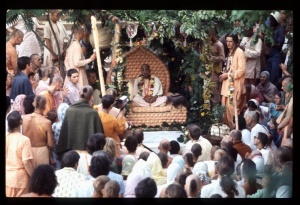SB 7.13.46

A.C. Bhaktivedanta Swami Prabhupada
TEXT 46
- śrī-nārada uvāca
- dharmaṁ pāramahaṁsyaṁ vai
- muneḥ śrutvāsureśvaraḥ
- pūjayitvā tataḥ prīta
- āmantrya prayayau gṛham
SYNONYMS
śrī-nāradaḥ uvāca—Śrī Nārada Muni said; dharmam—the occupational duty; pāramahaṁsyam—of the paramahaṁsas, the most perfect human beings; vai—indeed; muneḥ—from the saintly person; śrutvā—thus hearing; asura-īśvaraḥ—the King of the asuras, Prahlāda Mahārāja; pūjayitvā—by worshiping the saintly person; tataḥ—thereafter; prītaḥ—being very pleased; āmantrya—taking permission; prayayau—left that place; gṛham—for his home.
TRANSLATION
Nārada Muni continued: After Prahlāda Mahārāja, the King of the demons, heard these instructions from the saint, he understood the occupational duties of a perfect person [paramahaṁsa]. Thus he duly worshiped the saint, took his permission and then left for his own home.
PURPORT
As quoted in Caitanya-caritāmṛta (CC Madhya 8.128), Śrī Caitanya Mahāprabhu said:
- kibā vipra, kibā nyāsī, śūdra kene naya
- yei kṛṣṇa-tattva-vettā sei 'guru' haya
A guru, or spiritual master, can be anyone who is well conversant with the science of Kṛṣṇa. Therefore although Prahlāda Mahārāja was a gṛhastha ruling over the demons, he was a paramahaṁsa, the best of human beings, and thus he is our guru. In the list of gurus, or authorities, Prahlāda Mahārāja's name is therefore mentioned:
- svayambhūr nāradaḥ śambhuḥ
- kumāraḥ kapilo manuḥ
- prahlādo janako bhīṣmo
- balir vaiyāsakir vayam
The conclusion is that a paramahaṁsa is an exalted devotee (bhagavat-priya). Such a paramahaṁsa may be in any stage of life—brahmacāri, gṛhastha, vānaprastha or sannyāsa—and be equally liberated and exalted.
Thus end the Bhaktivedanta purports of the Seventh Canto, Thirteenth Chapter, of the Śrīmad-Bhāgavatam, entitled "The Behavior of a Perfect Person."